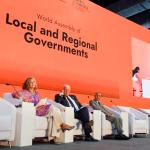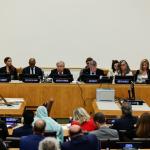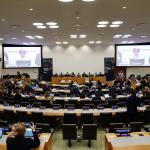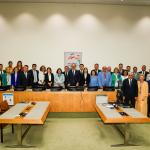
In the framework of the United Nations General Assembly, local and regional governments worldwide are launching their vision, laid out in the Report to UN75 on how Local and Regional Governments Envision the Global Future.
In 2020, on the occasion of the United Nations 75th anniversary, at a time of great challenge and in the midst of the "Decade of Action", Secretary-General Antonio Guterres called for unity and accelerated action for all the peoples of the world, convening a global dialogue to discuss human priorities and how we can build a better future for all. The international municipal and regional movement, convened by the Global Taskforce, joined the UN75 global conversation to ensure that the voices of cities and regions around the world are represented.
Our constituency has responded to the call with a report on what the state of multilateralism will be like in 2045, envisioning the future of the world achievable through the renewal of the multilateral model that responds to the dreams and expectations of our communities.
The report that our constituency of local and regional governments is presenting is the result of the vision and the leadership of cities and regions from all over the world, who envision a world that leaves no one and no place behind in the recovery from the pandemic and that considers everyone in the decision-making process.
Our constituency has also addressed the important role of local and regional governments leading the way during the pandemic in a session hosted at the UN SDG Action Zone.
We need to bring about a next generation of multilateralism that integrates local democracy at the core of peaceful societies
The current COVID-19 pandemic has shed light on some of the shortcomings of our current multilateral model and recalls the need for cooperation between different spheres of governance and between different actors. Local and regional governments are willing to be a part of the future of the multilateral system and ensure that the future livelihoods of our communities are drivers of global policies, and that the dreams and expectations of people all over the world truly shape actions and decisions.
Our collaboration with UN75 is now more relevant than ever, as our recommendations is an integral part of how we envision the future of our planet by putting communities at the center of the transformation of a renewed multilateralism. A world that ensures the provision of public services, that promotes local consumption and production patterns and an inter-city system that builds on the strength of cities and regions will be key to developing the next generation of multilateralism that our communities demand.
Local and regional governments ready to co-create the future that we want
2020 is, in spite of the worst of the pandemic, still an opportunity for dialogue. An opportunity to gather all stakeholders and ensure that their views are considered, that shared priorities are discussed, and that, together, we find ways to build a better future for all.
The Global Taskforce of Local and Regional Governments is convening a meeting on the 8th of October dedicated to discuss the findings of our report and the UN75 report and how best to take them forward at the local, regional and global level. The session will gather representatives from local and regional governments, as well as the presence of the highest level from the United Nations to debate the priorities for “recovering better” after the pandemic, debate our long-term priorities for the future, and what a renewed and networked multilateral system will look like.
The time for action is now. Our unique position as the constituency of local and regional governments is one that harnesses inclusion and co-creation, one that embraces the structural shift needed to move us towards “community-driven multilateralism”. It is the moment to establish a governance model based on making decisions following patterns of collaboration and not competition.
The greatest global challenges that the SDGs respond to need to be addressed at the territorial and local level and owned by the communities. Only then will we ensure that citizens can be part of the change that we need.
Further information:
- Visit our website on the Visionary Report here
- Read the full Visioning Report on How Local and Regional Governments Envision the Global Future




